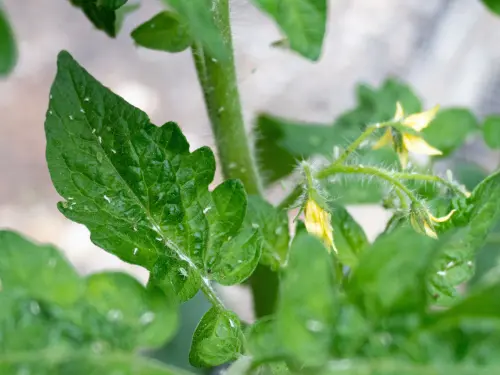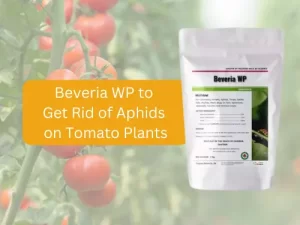Battling aphids on tomatoes can be quite the headache for gardeners. It is truly the case that these very small intruders perpetually drain your plantling energy and could be a major vector of disease spread. Discovering the features of aphids in your tomato growing and seeking to prevent their infestation with organic control measures will be the way to maturity of your garden. Embracing natural solutions for controlling aphids on tomato plants does more than just fend off these pests; it also protects our environment, our helpful insect friends, and the health of our beloved plants.

One effective strategy in how to get rid of aphids on tomato plants naturally is to ensure proper spacing. Crowded conditions favor aphid infestations by creating a microclimate that these pests find irresistible. Proper spacing improves air circulation, making the environment less hospitable for them.
Pruning is another critical cultural practice in managing aphids on tomatoes. By removing unnecessary foliage and keeping the plants tidy, you reduce the hiding spots for the pests and make it easier to spot and treat aphids on tomato plants early.
Mulching not only conserves moisture and suppresses weeds but also plays a role in controlling the pests on tomato plants. A well-mulched garden can deter aphids by creating a barrier and improving the overall health of the plants, making them less susceptible to aphid attacks.

Companion planting is a natural way to repel the pests. Plants like marigolds, garlic, and chives can deter aphids, providing a natural defense against these pests and reducing the need for more aggressive treatments.
Adopting these cultural practices is a foundational step in how to get rid of aphids on tomato plants naturally. Healthy, well-maintained plants are less likely to succumb to aphid infestations, making these practices an essential part of natural aphid management.
BEVERIA WP represents a significant advancement in the natural management of pests on tomato plants. This biopesticide employs Beauveria bassiana fungus to combat aphids, avoiding chemical pesticide environmental effects. It’s suitable for a variety of pests on both indoor and outdoor plants.
BEVERIA WP can also help to treat aphids on roses, whiteflies on tomato plants, and Spider Mites on tomato plants. Click the links to read about it.

Beauveria bassiana is an entomopathogenic fungus that acts as a natural pest aphid control on tomatoes. It is particularly effective against pests and other soft-bodied insects, offering a pet-safe and environmentally friendly alternative to chemical insecticides. This fungus has led to an effective agricultural pest control that is widely used in the greenhouse, field and nursery crops giving a bio safe choice of managing insects/pests across a wide range of settings.
The mode of action of Beauveria bassiana against them is both direct and efficient. Spores of the fungus adhere to the insect’s cuticle within 0-6 hours of contact and begin to germinate shortly thereafter. The pathogen penetrates the cuticle and uses insect nutrients, multiplying making it colonize its host within 24 to 48 hours which leads to death of the insect. This procedure to get rid of aphids naturally renders a nonpolluting way of controlling insects, an alternative to chemical pesticides.
BEVERIA WP is specifically designed for easy application and effective control of aphids on tomato plants. It gives us an unprecedented precision and is able to fight a large number of pests i.e. it is an environmentally friendly pesticide for indoor plants and home gardens. There is no harm to the environment because BEVERIA WP is 100% natural, and safe both for humans and environmental conservation. Not just to treat aphid on tomatoes, but it can also be used as a part of an integrated pest management program.
For effective control of pests, BEVERIA WP should be applied as a foliar spray or soil drench. For foliar application, mix 0.5-1.0 gram of BEVERIA WP per liter of water and apply evenly over the plants. And for soil application, mix 2-3 grams per liter of water and apply to the soil around the roots. Applications should be made every 7-10 days until the pest population is controlled.
Proper pre-mixing of BEVERIA WP ensures an even solution and minimizes residue on leaves and fruits. Apply it quickly and avoid direct light or heat to preserve Beauveria bassiana spores. BEVERIA WP, a fungicide for aphids, is compatible with many chemical and biological products, integral to management programs. Use wetting agents or adjuvants for improved results, adhering to label restrictions and precautions. Incorporate BEVERIA WP into your gardening for a natural aphid solution on tomatoes, enhancing plant health effectively. The maintenance of a healthier garden ecosystem besides supporting sustainable gardening practices is a plus for this.

Recalling the tomato aphids in a natural way involves multi-faceted treatments which consist of cultural methods, biological methods, and then chemical treatments if available. Through the incorporation of a NATURE-BASED approach like, the use of BEVERIA WP technique and embracing good garden practices, aphid exemption in tomatoes can be done by gardeners with effectiveness. Through incorporating this technique, you will be able to find out how to get rid of aphids on tomato plants.
Cutworms in gardens are a major menace to all..
As a farmer,I inspect my fields daily to monitor..
It all started with a worried farmer named Mr...

Leave a Reply